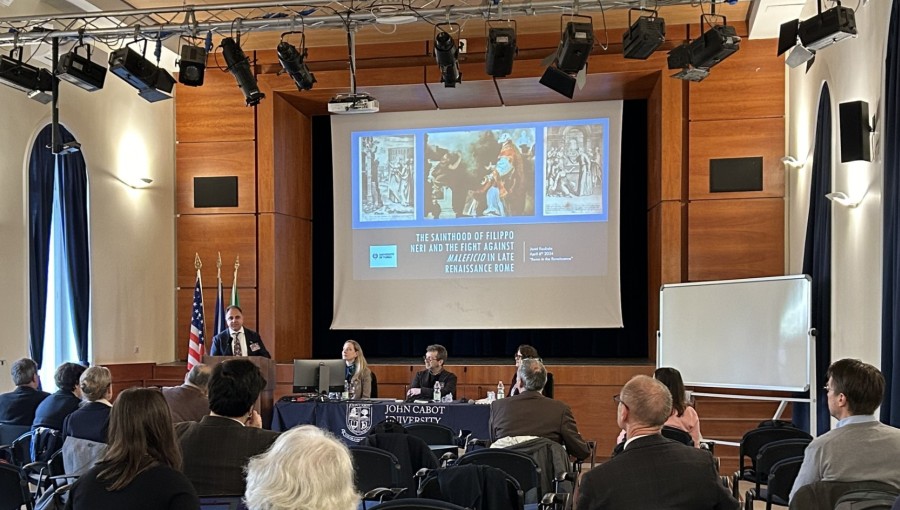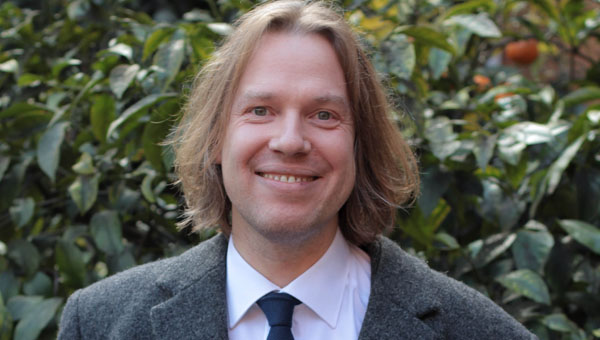A Pivotal Time in History: Spiritual Traditions in "The Axial Age"
John Cabot University’s Department of History and Humanities organized a talk called The Axial Age: An Age of Transformation in Ethics and Religions (900-300 BCE) on November 25, 2019. The speaker was Professor Teofilo F. Ruiz, Distinguished Professor & Robert and Dorothy Wellman Chair in Medieval History at the University of California, Los Angeles. Moderated by JCU History Professor Fabrizio Conti, the talk focused on the period between 900 and 300 BCE, during which most of the main religious and spiritual traditions emerged in Eurasian societies.

Professor Teofilo F. Ruiz – The Axial Age
The term ‘Axial Age,’ coined by German philosopher Karl Jaspers (1883-1969), refers to the period between 900 and 300 BCE, when the intellectual, philosophical, and religious systems that came to shape subsequent human society and culture emerged. A variety of religions and doctrines started developing around this time, some of which are still in practice today. Typically, each belief was rooted in a specific geographical area, and each developed its own value system, but they often shared some elements.
The battle of good vs evil
Zoroastrianism was founded by Zoroaster, also known as Zarathustra, an ancient Persian spiritual leader who lived between 1500 and 1000 BCE. One of the world’s oldest continuously practiced creeds, Zoroastrianism was the official religion of the Persian Empire. It was based on the Manichean idea of a dualistic universe divided between good and evil, and even though it promoted monotheism, it acknowledged the existence of two deities, Ahura Mazda, benevolent and good, and Ahiram, deceitful and wicked. Each individual was believed to have free will and the ability to choose between good and evil, which ultimately determined his or her fate. Zoroastrianism states that active and ethical participation in life through “good deeds, good thoughts, and good words” is necessary to ensure happiness and to keep chaos at bay. Life’s purpose is to bring happiness into the world, contributing to the cosmic battle against evil.
The four noble truths and the Eightfold Path
Buddhism, the world’s fourth-largest religion, originated in ancient India sometime between 563 and 483 BCE and was based on the teachings of Siddhartha Gautama, the Buddha. Born into a wealthy high caste family, around the age of 29 Siddhartha Gautama renounced his privileged condition and committed to an ascetic life. He later became a sage, a philosopher, a teacher, and a religious leader. Delivered in colloquial Sanskrit, Buddhism attracted many followers for its simple and clear teachings, which promote pluralism, peace, and tolerance, and because it offered an alternative to the Varna system that divided society into castes. Buddha believed in four fundamental truths, namely, that life is full of suffering, that all suffering is caused by desire, that one must renounce desire to rise above suffering, and that the only way to get rid of desire is to follow the practices of the Eightfold Path. The elements of this path are right views, right intentions, right speech, right actions, right livelihood, right effort, right mindfulness, and right concentration. Reincarnation is central in Buddhism, and true salvation can be attained when rebirths stop and the individual reaches nirvana or the state of enlightenment.
Non-violence and ascetic life
Jainism also originated in India, and its spiritual ideas and history are traced through a succession of twenty-four saviors and teachers known as tirthankaras. The last tirthankara, called Mahavira, was a contemporary of the Buddha. He is remembered as the one who revived and reorganized the religion. The fundamental principle of Jainism is ahimsa, or the belief that one must abandon all violent activity and commit to non-violence because otherwise, all religious behavior is worthless. Jainism holds that all living things have a soul and that all souls have the potential for the divine. Jainism has a strong ascetic tradition. Six outer and six inner austerity practices are the most common. Outer austerities include complete fasting, eating limited amounts, eating restricted items, abstaining from tasty foods, mortifying the flesh, and guarding the flesh by avoiding anything that is a source of temptation. Inner austerities include expiation, confession, respecting and assisting mendicants, studying, meditation, and ignoring bodily wants in order to abandon the body. Asceticism is viewed as a way to control desires and purify the soul, and Mahavira set an example of leading an ascetic life by performing severe austerities for twelve years.
Chinese philosophies
Confucianism originated around 551- 479 BCE in China and was based on the teachings of Confucius, a thinker and social philosopher. His philosophy emphasized personal and governmental morality, correct social relationships, and justice and sincerity. According to Confucius, each person should act with virtue in all social matters, including family, community, state, and kingdom, to ensure order and unity. Human beings were more important than property, as the story of the burning stables proves. One day, Confucius’ stables burned down, and when he was informed about it, he asked whether anyone was hurt, but he did not ask about the horses, which shows that he valued life more than property. Years after Confucius’ death, his teachings were compiled in the Analects.
Taoism, or Daoism, is a philosophical, ethical, and religious tradition that is attributed to Lao Tse, or Laozi, and that also originated in China. Taoism seeks to live in harmony with the Tao, or Dao, which denotes something that is both the source and the driving force behind everything that exists. According to Taoism, opposite and contradictory aspects, namely yin and yang, are present in all things. Taoism emphasizes concepts such as naturalness, spontaneity, simplicity, and detachment from desires.
History professor Teofilo F. Ruiz was born in Cuba and he moved to the United States in 1961. In 1974 Professor Ruiz earned a Ph.D. in History from Princeton University. Over a career that spanned almost four decades, Professor Ruiz was named “Outstanding Master’s Universities and Colleges Professor of the Year” by the Carnegie Foundation for the Advancement of Teaching, he received UCLA’s Distinguished Teacher Award, and he was awarded a National Humanities Medal by President Barack Obama. With over thirteen books and numerous articles, Professor Ruiz’s scholarship has been recognized with fellowships from Mellon, Guggenheim, and the National Endowment for the Humanities (NEH).





